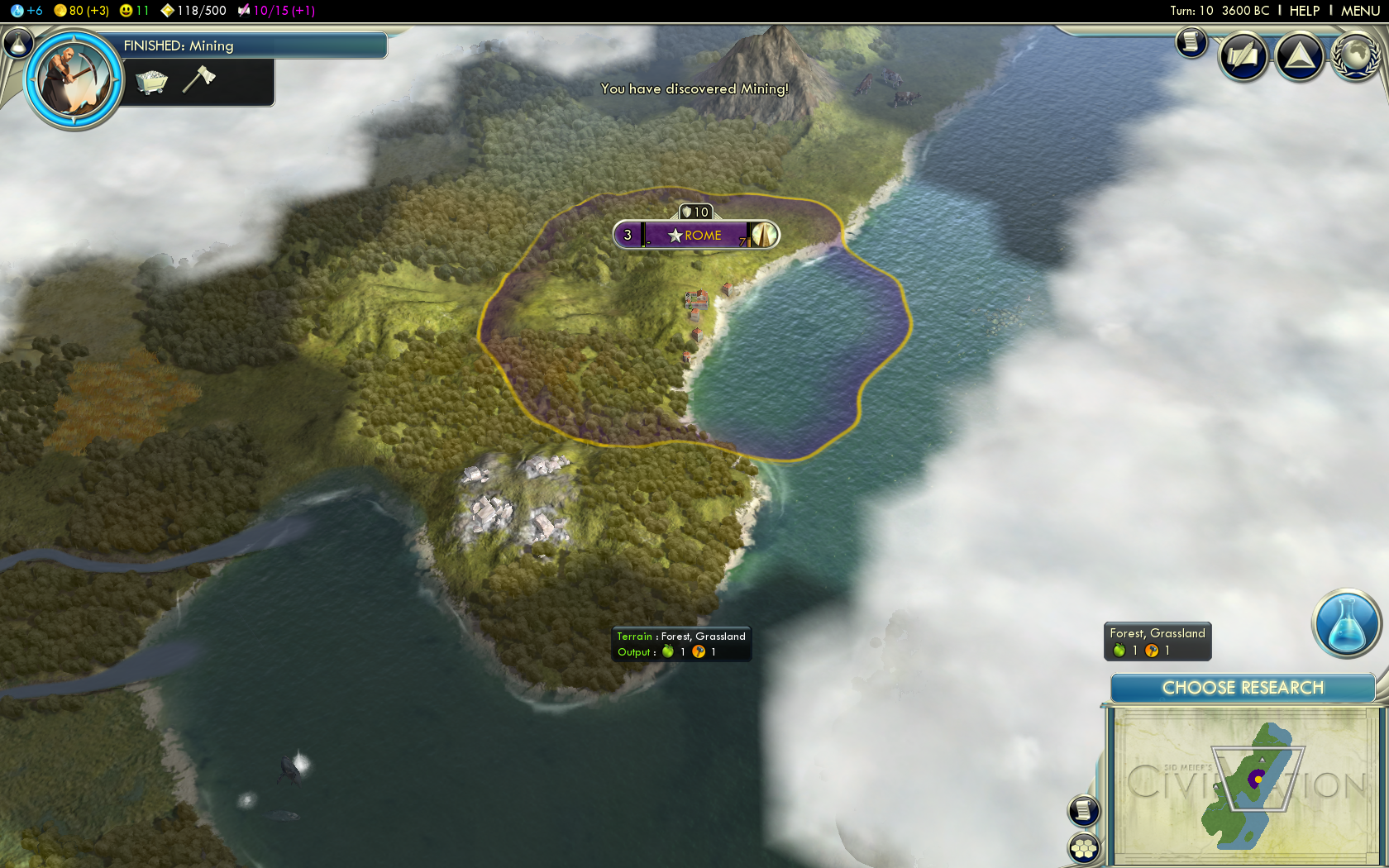Completely engrossed in the action and strategy, I clicked the “turn” button just one more time, eyes barely managing to stay open even at the clock’s chirp of 4 AM, with only three hours until school started. Mere moments later, the other player had overrun my capital city and second largest city. Disgusted at this move and hungry for revenge, I sent every single attack unit to the rescue, saving my cities from this dastardly enemy player. Finally, with my renewed vigor, I marched all my armies to the enemy and took over all of its cities, showing no mercy for their unfound attacks on my territory. Victory is mine!
You know what is amazing? Even after this two-hour stint in Civilization III of a game that had already been going strong for around 25 hours total, I was seriously enjoying the game, which had unlimited possibilities and no end in sight. (Also, I could make up for the complete lack of sleep during lunch time in school.)
But I wasn’t thinking that this was too hard, too big, or too long of a game. But some think that it is.
Too Big and Too Hard? Really?
John Davison of GamePro wrote an article titled “Too Big and Too Hard” that discussed how game developers believe that games are far too complex these days. In it, he pointed out with gameplay statistics that a majority of gamers — around 95 percent — never actually finish the games they start, and only 90 percent of gamers play a game for four to five hours before it starts collecting dust.
The thing is, we’re not playing it wrong. What’s happening is that studios are starting to look at the way they make games and concede that they’re making them wrong … Younger gamers demand something more sophisticated, while older gamers don’t have the time or energy to play through something built around a punitive system for a bazillion hours.
Even though I agree with much of what Davison points out in his article, I have to pose a few simple questions: should studios be developing for the 95 percent of gamers that don’t spend but a few hours with the game, don’t dedicate hours upon hours engrossed in the game, don’t spend time developing FAQs and walkthroughs for the game, don’t spread the word about the game, don’t go out of their way to build communities for thee game, and don’t necessarily stick around to purchase downloadable content for the game?
Sturgeon’s Law states that “ninety percent of everything is crud.” So are studios supposed to be developing for that 90 percent of gamers who are the “crud” of the equation? Should they really develop for them instead of the few who have the most influence over the popularity of their games: the hardcore fans?
Where would the creativity, challenge, and depth of games be if it wasn’t for those hardcore fans that always yearn for something more?
It’s Never Enough
But I do have an issue with one of Davison’s statements: “Games are too hard, they’re too long, and they provide way too much stuff.”
Games are not too hard. Sure, games pose challenges that, for some (maybe for many), are more frustrating than others, but does that really make them too hard?
For example: I love racing simulators, which are naturally difficult because racing around a track in real life is difficult. The closest thing I have to that is Forza Motorsport on the Xbox 360 and Gran Turismo on the PS3. These games simulate real-world racing, and they are, without question, very difficult unless you turn on all kinds of assists to help you get around the track. There are also an endless amount of tweaks and settings. But does this mean that this type of game is too hard? Absolutely not! It is this challenge and difficulty that makes these games so successful. Gamers don’t purchase these types of games because they are easy — they purchase them because they are hard!
Games are not too long. I never managed to get past the 10th level on Pacman. I never managed to beat Super Mario World. I never played through the entire lifespan of my Sim on The Sims. I never maxed out a character on World of Warcraft.
Are all these games too long? What I’m getting from Davison is that he believes they are.
Regardless, how does someone claim that a game is too long or too short anyways? There are certain gamers who can play games for hours and hours, beating them within a day or two (I am not one of those types). Then there is the type of gamer who can play a game for an hour or two and return only after weeks have passed (that sounds more like me). To develop a game that offers just enough for me but not enough for the hardcore gamer is silly. And to develop a game that you have to play for tens of hours just to begin enjoying it and be rewarded would be just as ridiculous.
Games do not have way too much stuff. With the trend of games including more customization and, more recently, user generated content, the thought that games are including too much is a bit harsh.
It only takes a quick glance at the popularity of a game like The Sims to understand the true power of games that include a lot of stuff. It’s absolutely crazy: people are willing to fork out $20 bills for content expansion packs that are probably way overpriced, but they do it anyways. People want this stuff, and they are willing to pay for it.
Need vs. Want
Furthermore, I have never actually seen a game criticized for offering too much. I have, however, seen games criticized for not offering enough direction or story. But that is a different issue entirely. If a game offers plenty of content, that creates a great amount of value. I simply can’t imagine too many gamers complaining that they got too much from their $60 investment.
However, Davison really inspired me to write this by making a statement that truly dumbfounded me:
The vast majority of gamers don’t need more. They don’t have the time or the inclination to invest enormous amounts of time and effort with a game.
Yes, I am going to hammer on the “need” portion of that statement.
It doesn’t matter what gamers “need.” It matters what gamers want, because what they want and what they are given is what determines how willing they will be to open up their wallets. There is huge difference between getting just enough and more than expected, and I truly believe gamers want to be blown away by what is offered, especially as the price of games go up and downloadable content takes off.
Of course we don’t need to have at least 20 hours of gameplay, but that is what we want. We want even more if possible. It doesn’t matter why we want it, and it doesn’t matter if we are insane for wanting it. That is what we are willing to pay for and demand, so that is what game developers create and supply to us.
Back to Civilization
So now comes the time where I bring my argument full circle. Remember how I was talking about my experiences with Civilization III at the beginning of this article? Recall how engrossed I was in this game, which required so much time, effort, thought, dedication, and, at times, frustration?
Well, I have never actually completed a single Civilization game!. This is also true for all of the previous and future titles in the series as well.
But the beautiful part is that I have absolutely no issue with that fact. It is my choice, and it is in no way the fault of the developers. Ironically, in a way, if I actually completed a single Civilization game, I might not appreciate it as much as I have for all of these years.
So to say that Civilization III, IV and, soon to be released, Civilization V games are too long, too big, too hard, and too complex would be crazy. It’s the massive scale and endless possibilities that keep me around and wanting more. Just knowing the fact that there is so much more to that game, gives me the comfort of knowing that there will always be something different to experience the next time I start it up.
Does it really matter that I may never finish a single game? Not in the slightest!
So keep aiming big, game developers. I’m greedy. I want all the explosions, customizations, and options that you can throw at me. I want the open worlds and limitless possibilities. I want to be overloaded with content to the point where my eyes bleed. I want the value.
What do you think?





GIPHY App Key not set. Please check settings
One Comment